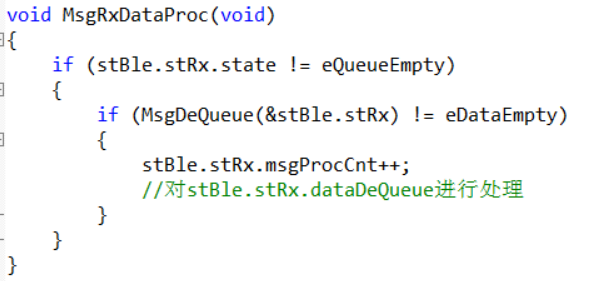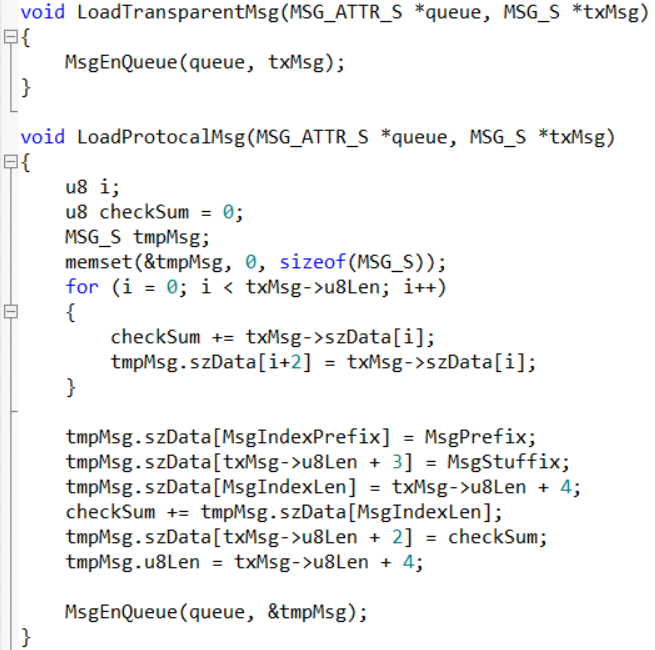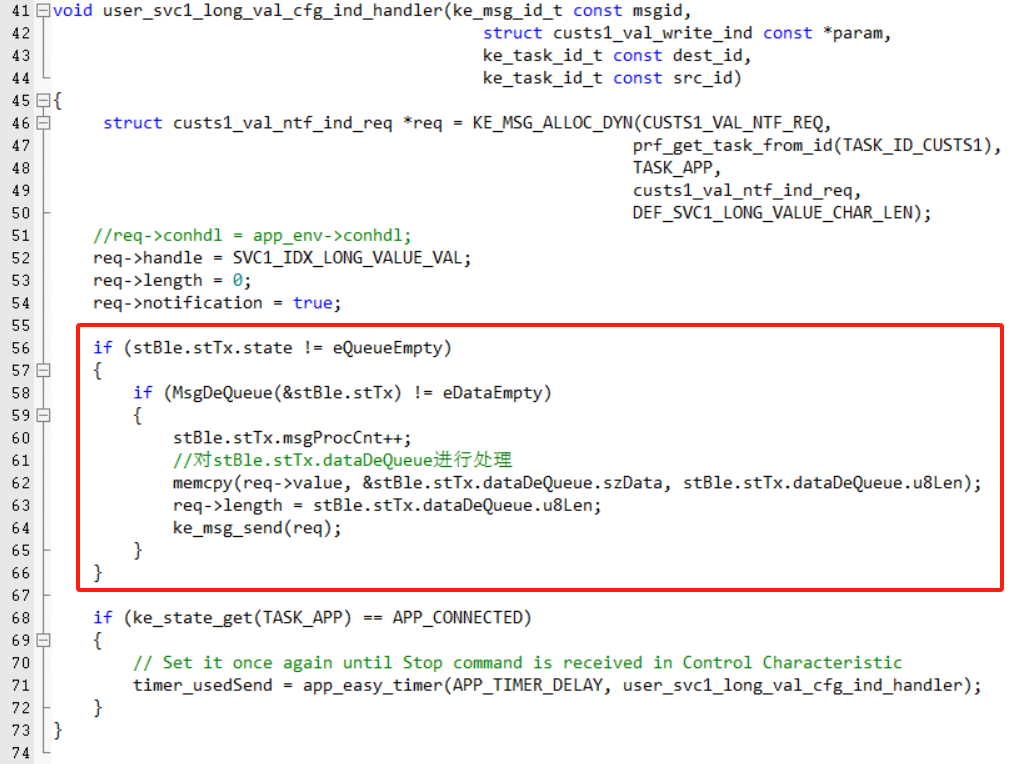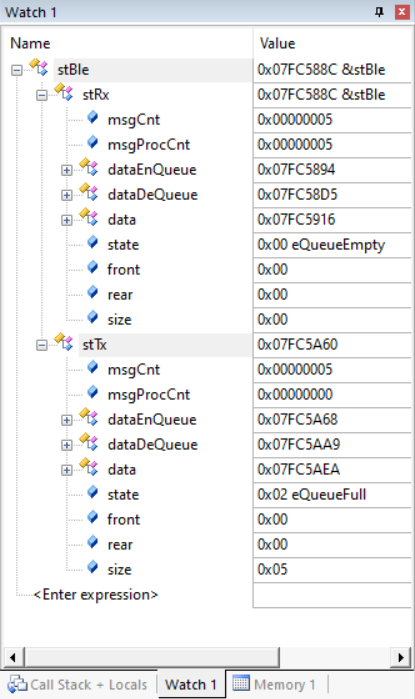前言
消息队列缓存,支持阻塞、非阻塞模式;支持协议、非协议模式
可自定义消息结构体数据内容
使用者只需设置一些宏定义、调用相应接口即可
这里我用蓝牙消息服务举例
有纰漏请指出,转载请说明。
学习交流请发邮件 1280253714@qq.com
原理讲解
队列采用"生产者-消费者"模式,
当接收数据时,生产者即为外部输入,输入的消息入列;消费者即为消息处理函数,处理消息前先出列,然后消费者处理出列的消息
当发送数据时,生产者为消息产生的任务,该任务将产生的消息入列;消费者为消息发送任务,该任务将待发送的消息出列并发送。
接口
接收消息接口
以蓝牙接收消息服务为例

接收消息处理接口
这里我开了一个定时任务来处理消息


待发送消息装载接口
由任务产生消息并调用装载函数,以下提供透明传输和协议传输接口

待发送消息发送接口
以蓝牙发送消息服务为例,这里我先进行出列判断,如果数据成功出列,则将消息通过蓝牙的内核发送出去

代码
msg.h
#ifndef _MSG_H
#define _MSG_H
#include "includes.h"#define MsgProtocol 1 //是否使用协议
#define MsgBlock 1 //消息是否阻塞,即当队列已满时,是否继续入列,//入列会导致前面接收到且未来得及处理的数据被覆盖 #define QueueMaxSize 5 //队列最大存放的数据个数
#define MsgMaxSize 64 //单帧数据最大长度
#define MsgPrefix 0xA5
#define MsgStuffix 0x5A
#define MsgIndexPrefix 0
#define MsgIndexLen 1
#define MsgIndexCmdId 2
#define MsgIndexCmd 3
#define MsgIndexDataBase 4typedef enum //队列当前状态
{eQueueEmpty, //队列为空eQueueNormal, //队列不为空eQueueFull, //队列已满
} QueueState_E; typedef enum //出列的数据情况
{eDataEmpty, //数据为空eDataNormal, //数据不为空
} DeQueueState_E; typedef struct //数据格式
{u8 u8Len;u8 szData[MsgMaxSize];
} MSG_S; typedef struct //队列结构体
{u32 msgCnt; u32 msgProcCnt;MSG_S dataEnQueue;MSG_S dataDeQueue;MSG_S data[QueueMaxSize];QueueState_E state; //队列当前状态u8 front; //队头u8 rear; //队尾u8 size; //队列大小
}MSG_ATTR_S;typedef struct //蓝牙消息结构体
{MSG_ATTR_S stRx;MSG_ATTR_S stTx;
}BLE_MSG_S; QueueState_E MsgQueueStateDetermine(MSG_ATTR_S *queue);
void MsgEnQueue(MSG_ATTR_S *queue, MSG_S *data);
DeQueueState_E MsgDeQueue(MSG_ATTR_S *queue);
void MsgRxDataProc(void);
int MsgProcCrc(u8 *pRxData);
void LoadTransparentMsg(MSG_ATTR_S *queue, MSG_S *txMsg);
void LoadProtocalMsg(MSG_ATTR_S *queue, MSG_S *txMsg);
void BleMsgInit(void);extern MSG_ATTR_S stRxQueue;
extern BLE_MSG_S stBle; #endifmsg.c
#include "includes.h"BLE_MSG_S stBle;int MsgProcCrc(u8 *pRxData)
{u8 i = 0;u8 crc = 0;u8 size = pRxData[MsgIndexLen];if ((pRxData[MsgIndexPrefix] == MsgPrefix) && (pRxData[size - 1] == MsgStuffix)){for (i = 1; i <= size - 3; i++){crc += pRxData[i];}if (crc == pRxData[size - 2]){return 0;}}return -1;
}QueueState_E MsgQueueStateDetermine(MSG_ATTR_S *queue)
{
#if MsgBlockif (queue->size == 0){return eQueueEmpty;}else if (queue->size == QueueMaxSize){return eQueueFull;}else{return eQueueNormal;}
#elseif (queue->msgCnt == 0){return eQueueEmpty;}else if ( queue->msgCnt > 0){return eQueueNormal;}
#endif
}void MsgEnQueue(MSG_ATTR_S *queue, MSG_S *data)
{
#if MsgBlockif (queue->size == QueueMaxSize){return;}
#endif queue->dataEnQueue = *data;queue->data[queue->rear] = queue->dataEnQueue;queue->size++;queue->msgCnt++;queue->rear++;if (queue->rear == QueueMaxSize){queue->rear = 0;}queue->state = MsgQueueStateDetermine(queue);}DeQueueState_E MsgDeQueue(MSG_ATTR_S *queue)
{if (queue->size == 0){return eDataEmpty;}queue->dataDeQueue = queue->data[queue->front];memset(&queue->data[queue->front], 0, sizeof(queue->data[queue->front]));queue->size--;queue->front++;if (queue->front == QueueMaxSize){queue->front = 0;}queue->state = MsgQueueStateDetermine(queue);return eDataNormal;
}void MsgRxDataProc(void)
{if (stBle.stRx.state != eQueueEmpty){if (MsgDeQueue(&stBle.stRx) != eDataEmpty){stBle.stRx.msgProcCnt++;}}
}void LoadTransparentMsg(MSG_ATTR_S *queue, MSG_S *txMsg)
{MsgEnQueue(queue, txMsg);
}void LoadProtocalMsg(MSG_ATTR_S *queue, MSG_S *txMsg)
{u8 i;u8 checkSum = 0;MSG_S tmpMsg;memset(&tmpMsg, 0, sizeof(MSG_S));for (i = 0; i < txMsg->u8Len; i++){checkSum += txMsg->szData[i];tmpMsg.szData[i+2] = txMsg->szData[i]; }tmpMsg.szData[MsgIndexPrefix] = MsgPrefix;tmpMsg.szData[txMsg->u8Len + 3] = MsgStuffix;tmpMsg.szData[MsgIndexLen] = txMsg->u8Len + 4;checkSum += tmpMsg.szData[MsgIndexLen];tmpMsg.szData[txMsg->u8Len + 2] = checkSum;tmpMsg.u8Len = txMsg->u8Len + 4;MsgEnQueue(queue, &tmpMsg);
}void BleMsgInit(void)
{memset(&stBle, 0, sizeof(BLE_MSG_S));
}
一个图图


验证)


)







——从数据资产谈起 MySQL的DOS命令、常用数据类型、SQL语句的分类 SQL函数)

)




